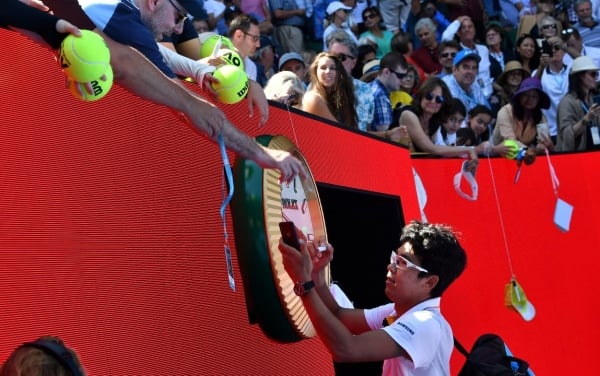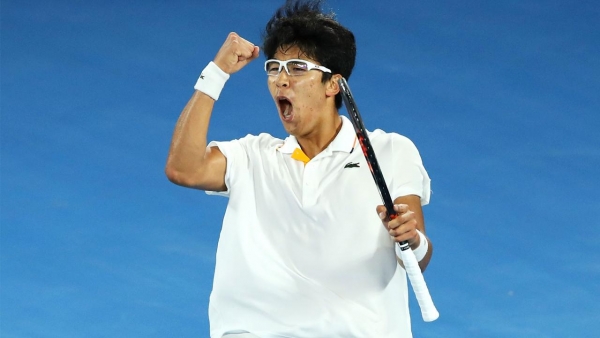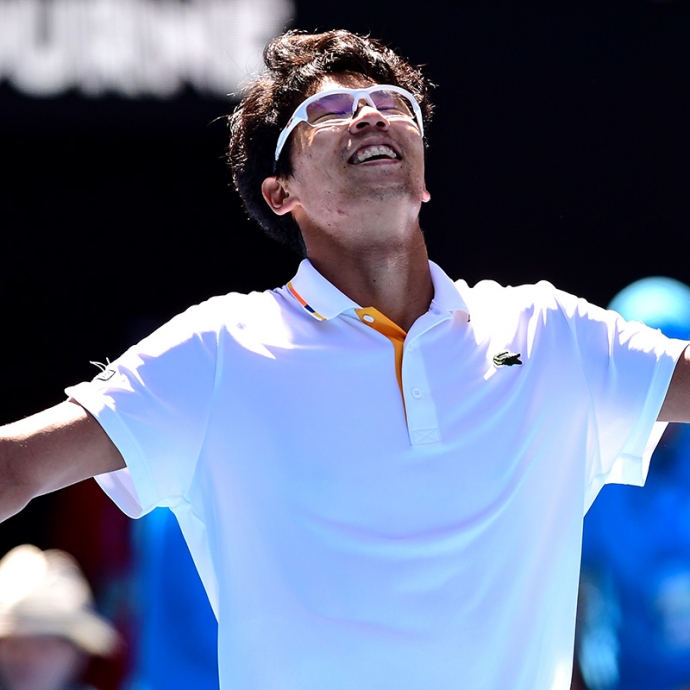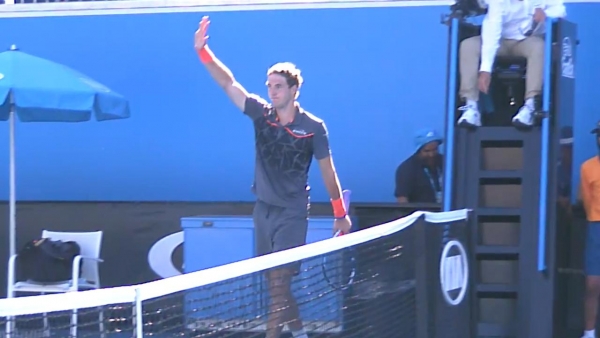Li Na stands tall as Asia’s original Grand Slam-winning trailblazer. Kei Nishikori is still in the hunt.
For years, the pair have been flag-bearers for tennis across the sport’s fastest-growing region, and while translating into heightened interest and big bucks, there is no hiding the fact Li remains Asia’s sole Grand Slam singles champion.
Since the Chinese star’s retirement, Japan’s Nishikori has had a lonely time of it carrying those enormous expectations from such an expectant and emerging geographical market.
While China and Japan have had a steady sprinkling of top-100 players, none has come close to emulating either Li’s or Nishikori’s achievements.
An athletic and powerful South Korean youngster – his legs like tree trunks, a wry smile that reveals braces and always wearing his signature white glasses – could be about to change all that.
World No.58 Hyeon Chung is suddenly huge news back home as the first Korean to reach a Grand Slam semifinal.
He is the lowest-ranked man to reach the last four at the Australian Open since Marat Safin in 2004 and at 21, the youngest to reach the semifinals at a major since Marin Cilic at Melbourne Park in 2010.
His victims on his run include No.4 seed Alexander Zverev and his idol, six-time Australian Open champion Novak Djokovic.
That fourth-round upset of the Serb was the most watched Grand Slam match in history on South Korea’s JTBC Sports, four times bigger than last year’s Roger Federer vs Rafael Nadal Australian Open final telecast.
“Not only for tennis fans in Korea, but the whole nation was amazed at his performance and it brought him to the attention of many people,” Korea Tennis Association official Da Jung Hong said.
“His result, reaching the quarterfinals, hit the headlines in all the major medias in Korea, and the SNS [social media] was full of his performance.
“On the No.1 portal site in Korea, Naver, Hyeon Chung was No.1 ‘trending now’ for a long time.”
Chung is perfectly poised to steal some of the spotlight from the 28-year-old Nishikori, a player whose injury struggles have mounted in the past year.
Much like the Japanese star, his greatest weapon is his legs, helping him slide and scramble about the baseline and pivotal to his enormous power off the ground.
Tennis Korea editor Leo Seungwon Baek said while Chung may be somewhat oblivious to his newfound status, there would be no hiding from it back home.
“Korea is really envious of the success of Nishikori,” Baek said. “Before Chung, the greatest player was Hyung-taik Lee, and he’s retired.
“His highest ranking was 36 [in 2007]. From Chung’s Australian Open success, he broke the record as the new best Korean. We are really happy with that.
“I’ve heard that in Korea now he is as famous as [Olympic champions] ice skater Yuna Kim and swimmer Tae-hwan Park.”
Chung’s rise is not all together sudden. Two years ago he stood on the cusp of the top 50 before injuries scuttled his progression. He was a runner-up in the 2013 Wimbledon boys’ singles final.
And he was not the only top Korean junior making an impact at the time. Duckhee Lee, now aged 19, was ranked as high as No.3 in the junior rankings, but has found the transition to the tour a tougher hurdle. Ranked as high as No.130 last April, the teenager fell in the third round of qualifying at this year’s Australian Open. What makes Lee’s story all the more remarkable is the fact he was born deaf, having to hear vibrations and rely on hand gestures to determine line calls.
In a nod to Korean tennis’s future, Chung defeated Lee in an ATP Challenger final in Chinese Taipei at the end of 2016.
With Lee having dropped back to No.195, it is his high school friend Soonwoo Kwon who has quietly assumed the mantle as second-best Korean. The 20-year-old had not garnered the same level of attention as either Chung or Lee until he won the Australian Open Asia-Pacific Wildcard Playoff in Zhuhai, China in December.
At the time, he said his dream was to play Federer in the opening round. It very nearly eventuated. Had he beaten German Jen-Lennard Struff on debut he would have earned that honour.
Born in the small town of Sangju – more famous for producing dried persimmons than tennis players – Kwon finished 2017 with a 27-17 record at Challenger level.
Hong said Chung’s breakthrough would only serve to motivate his compatriots, which can only be a good thing for the Korea Davis Cup team.
“It seems like Chung's success will have a great influence both on Duckhee Lee and Soonwoo Kwon,” Hong said. “At the same time, it is expected to have a positive impact on each other preparing for the Davis Cup as Korea national team.”
A handful of rising juniors add further depth to Korea’s potential to become a tennis powerhouse.
A pair of 17-year-olds, No.4 seed Uising Park and Yeong-seok Jong, featured in the Australian Open junior boys’ singles, however both failed to progress beyond the first round.
And following in the footsteps of Yoon-Jeong Cho (No.45 in 2003) and Sung-Hee Park (No.57 in 1995), Baek said 15-year-old Sohyun Park was flying the flag as the best of the female Korean prospects.
“She will be the best of the Korean women,” Baek said. “Last year she got a wildcard into Roland Garros qualifying.
“This is her first juniors main draw and she will play all junior slams this year, while still attending high school.”
Tennis is “trending now” in South Korea. In a nation of 51 million people, the flow-on effect of Chung becoming a household name almost overnight is sure to see the sport trending for years to come.



